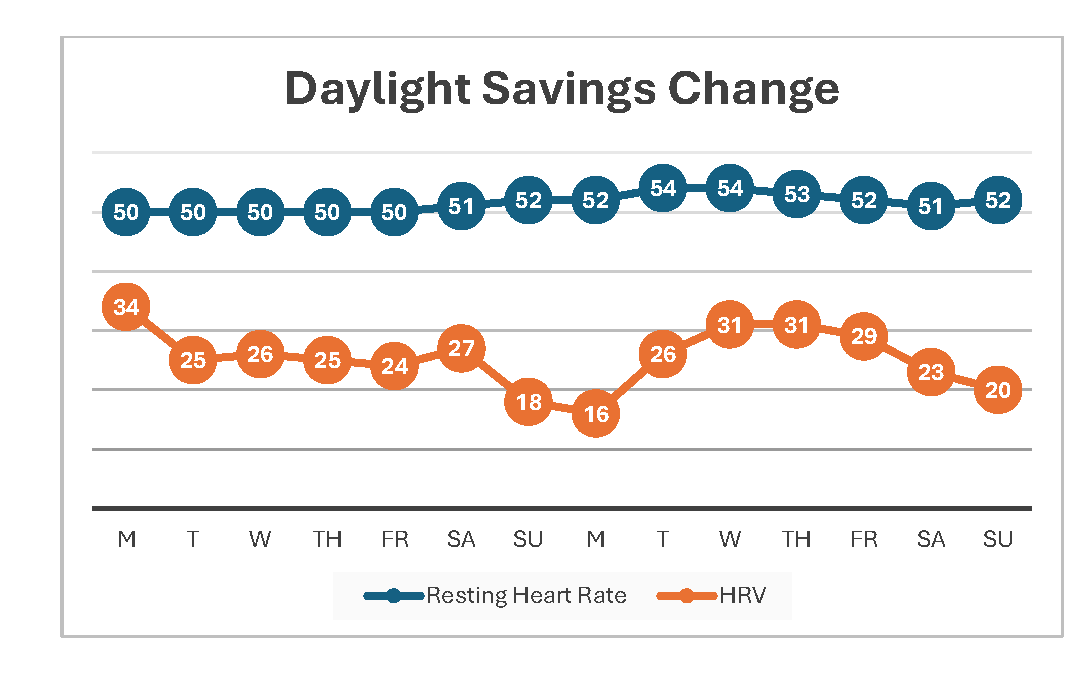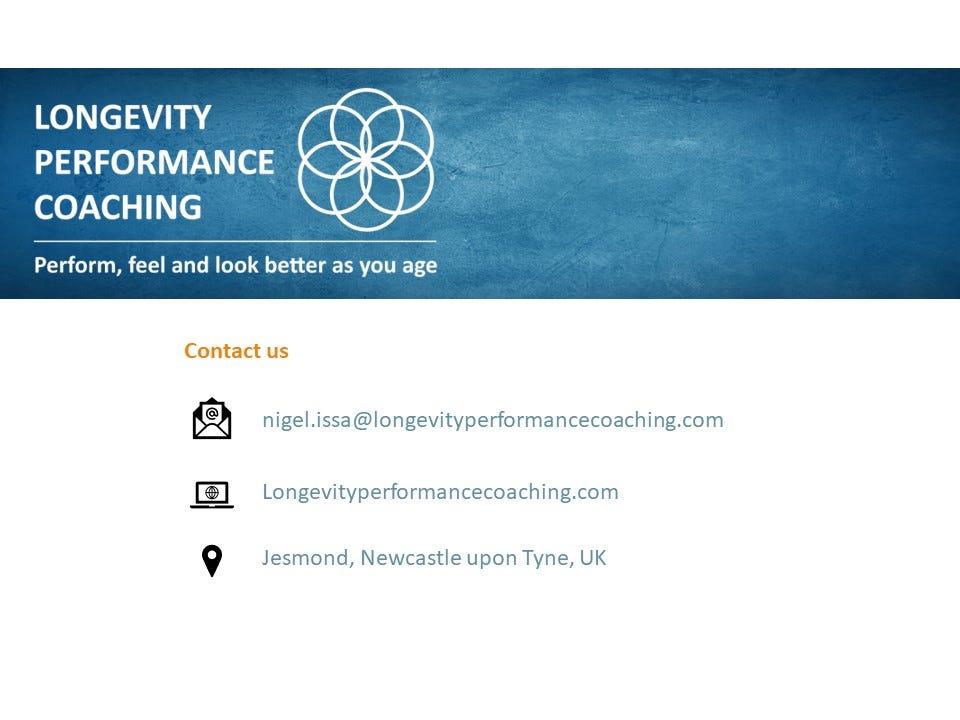#16 How to reduce work fatigue
This post will cover how your work life especially in global roles affects your heart, how it affects your performance and what you can do about it.
I was at talk run by medical and alternative therapy practioners recently. The talk was about nutrition and specifically snacking.
The talk didn’t start with a nutritionist. It started with a Consultant in Sleep Medicine, Dr Ceri Sutherland. Who has an interest in sleep and circadian biology and more recently has extended this interest into the related topic of fatigue. She runs an NHS sleep practice and a private practice, Idos Health and Wellbeing.
The key messages were:
The circadian rhythm is hard wired into our biology.
Time zones are an artificial articulation of time and are often not aligned with the circadian rhythm in a specific place.
When a population experiences a change to time, it can have such an impact on their health, that there is a spike in heart attacks in the days after daylight saving changes to time zones.
Food digestion and metabolism, align with the circadian rhythm and the later you eat in the day the more disruptive the impact is on sleep profiles and metabolic processes.
This triggered my interest in the circadian rhythm and how it affected me during my consulting and corporate career.
What is the Circadian Rhythm?
The circadian rhythm is a natural, internal process that regulates the sleep-wake cycle and repeats roughly every 24 hours. It's often referred to as the body's internal clock. This rhythm is influenced by external factors such as light and darkness, and it helps to regulate various biological processes, including sleep, metabolism, hormone production, and body temperature.
The circadian rhythm is controlled by a region of the brain called the suprachiasmatic nucleus (SCN), which is located in the hypothalamus. The SCN receives information about light and darkness from the eyes, helping to synchronize the body's internal clock with the external environment.
The diagram below sets out the daily rhythm and highlights certain times in the day when physical and mental tasks are optimal.
Today’s workplace messes with your rhythm
In the digital workplace with video calls, instant messaging and smart phones, work is not confined to your countries time. Many roles are globalised in nature which means the working day can be elongated or even reset.
I had lead teams in India who worked a mid Atlantic time zone so they could maximise call time with Europe and the USA. What this meant was they worked late into the night and missed most of the daylight each day disrupting their circadian rhythm. I used to find a high sickness level in these teams, which now I understand was probably due to the continual disruption of their circadian rhythm.
This elongation of meeting times also affects eating times which if delayed to late at night also disrupts the circadian rhythm, especially sleep and the metabolism.
If you work in globalised work environment, you are very likely to take trips to meet customers, colleagues or suppliers, where they are located. Again regularly disrupting your circadian rhythm.
What this creates is layers of constant disruption leading to fatigue, weight gain and stress.
I used to live this global work life from 2010 to 2022. I travelled from the UK to Australia, Indonesia and China in the east, to San Francisco in the west, Argentina and South Africa in the south. Plus regular day trips to mainland Europe.
I was always surprised how tired I felt the next few days after a day trip to Paris on the Eurostar when most of the day was spent just sitting on the train.
Luckily for my sanity I didn’t start wearing a smart watch till 2022 when I stopped my global travel. If I had, seeing the impact on my heart would have been shocking.
I now have clients who operate in these global roles and their smart watches are connected to my App so we can monitor their biometrics. What we see is highly variable heart rates and low sleep durations. All of them have high cholesterol and higher than healthy body fat.
The impact is more than you might realise
If you have a Fitbit, Apple or Whoop smart watch they have some important data collection capabilities you may not be using to help you manage fatigue.
You probably keep an eye on the sleep score, you may monitor your resting heart rate but the key outcome you really need to be focused on is heart rate variability.
Heart rate variability (HRV) is a measurement of the variation in time between successive heartbeats. It is a useful tool in assessing the functioning of the autonomic nervous system, which regulates many of our body’s involuntary functions, including heart rate, breathing rate, and digestion.
HRV is controlled by the sympathetic and parasympathetic branches of the autonomic nervous system, which work in opposition to regulate our body’s functions. The sympathetic nervous system is responsible for our “fight or flight” response, while the parasympathetic nervous system is responsible for our “rest and digest” response.
A higher HRV indicates that the parasympathetic nervous system is dominant, which means that the body is in a state of relaxation and recovery. Conversely, a lower HRV indicates that the sympathetic nervous system is dominant, which means that the body is in a state of stress and exertion.
HRV is a valuable tool in assessing overall health and identifying potential health risks. It is affected by various factors, including age, fitness level, stress levels, and sleep quality. As we age, our HRV tends to decrease, and this decrease is associated with an increased risk of developing chronic health conditions.
Furthermore, research has shown that a low HRV is associated with an increased risk of mortality from various health conditions, including heart disease, diabetes, and cancer. Therefore, monitoring our HRV regularly can help identify potential health risks and enable us to take steps to address them. (Source Peter Stas | Jun 17, 2023 CardioMood website. Read the full article here )
Note the last two paragraphs and the serious risk to health from having a low HRV.
Yet the global working culture is constantly disrupting the circadian rhythm that impacts how you sleep, eat, stress levels and capability to improve fitness that have a direct impact on HRV.
To illustrate the impact I have two real life cases from my own data. The first is the impact on HRV and resting heart rate from a one hour change in day light savings. The time changed on the first Sunday and you can see the drop in HRV but also the rise in resting heart rate that took 6 days to return to pre-clock change levels.
This time change is the same as going from London to Paris for the night.
The second is more extreme but illustrates the impact of long haul flights. This one was 25 hours of travel from the UK to Sydney. Again HRV and resting heart rate is disrupted for over a week.
If you want to see the impact of being a successful entrepreneur. The graph below shows the resting heart rate change for one of my clients, the week they successfully sold their business.
So your working challenge is, that you are experiencing constant layers of disruption to your circadian rhythm that affects your HRV, which doesn’t get time to recover, increasing your fatigue levels but also your probability of getting chronic health conditions.
What can you do?
The reality is many interesting, challenging and well rewarded roles are global in nature. So unless you want to change roles then there are 6 things you can do to reduce the risk. If you are a leader of a global team you can show real wellbeing leadership by creating a culture where your team can follow these actions.
Stay aligned with your circadian rhythm - build your schedule around it on the days you aren’t travelling, especially morning sunlight, eating before 7pm each day and reducing exposure to artificial light in the evening to improve sleep quality
Monitor HRV - it will vary as you exercise or experience high intensity working days but the key is to increase your recovery time if it stays low for more than 2 days. If that happens give yourself a break and recover with nutritious food, sleep and stress reducing activity e.g. just quietly reading.
Balance your schedule - time zone changing travel takes a week to recover from so organise your schedule to give you time to recover. This could be placing a limit on long haul travel to no more than once every 6 weeks and short haul to once every 3 weeks. The same with late night calls or even work related social events. Limit the amount you do and avoid consecutive days doing it so you have time to get back in to your circadian rhythm.
Get fitter - the fitter you are the faster you can recover so if you live a global work life invest in your fitness including when you travel. You can read my post on this Click here.
Don’t mask fatigue with coffee - When you wake up your habit will be to reach for the coffee but your body actually needs hydration and electrolytes. They replace what has been lost over night and feeds the high brain alert function you have in the morning. Feed that need first and the coffee desire goes away and returns about 11am when you need the caffeine to help maintain alertness as the circadian rhythm moves out of that phase but you still need the capability at work.
Avoid alcohol on stressful days - Stressful days often result in the I need a drink reaction. Problem is alcohol disrupts sleep quality. So by drinking alcohol to offset stress you also disrupt sleep, now creating two negative factors that reduce HRV. Eat some good quality chocolate instead if your having a bad day!
The sun and the moon dictate your circadian rhythm. Work creates an artificial rhythm that is fighting against millions of years of circadian rhythm biology. If you want to reduce fatigue, learn to recover better and reduce your risk of chronic health conditions. Align your day with this rhythm and learn to manage recovery when it is disrupted.
You will perform, feel and look better if you can do this.









